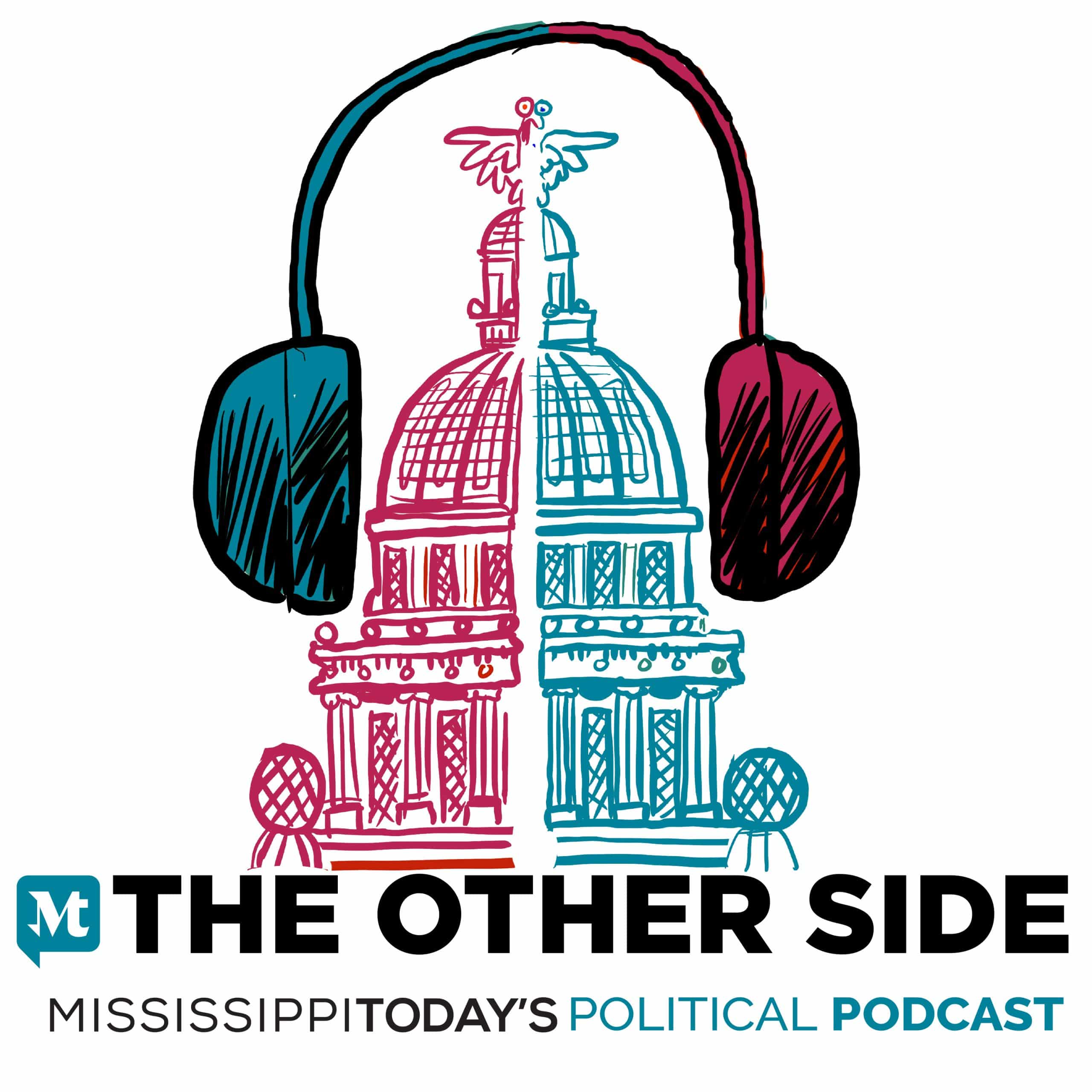Mississippi Today
Dan Jones exposed a major political problem for Tate Reeves

Dan Jones exposed a major political problem for Tate Reeves
Note: This editorial anchored Mississippi Today's weekly legislative newsletter.Subscribe to our free newsletterfor exclusive access to legislative analyses and up-to-date information about what's happening under the Capitol dome.
You almost certainly heard about the bombshell story former University of Mississippi Chancellor Dan Jones told at a press conference last week.
Jones said that Gov. Tate Reeves, Mississippi's most staunch public opponent of Medicaid expansion, acknowledged to Jones in a private meeting several years ago the benefits of expansion. The governor, Jones recalled, then said he couldn't champion it publicly because of “my personal political interest.”
Reeves, as he often does when challenged, got nasty. He said Jones was lying and referred to Jones only as “this dude.” You know, the longtime Baptist medical missionary and deacon. The six-year chief of the state's flagship university. The years-long leader of the state's largest hospital and dean of the state's only medical school. The one-time national president of the American Heart Association. Just “this dude.”
As Jones spoke last week, a crowd of curious lobbyists — including a couple of Reeves' former staffers — gathered in the rotunda to hear what he had to say. Jones, in less than five minutes, did what so many people under the dome have never dared: he called Tate Reeves out. While doing so, he laid out a succinct case for Medicaid expansion that the governor himself couldn't ignore.
And Reeves' hot-headed response to the whole thing may be all we need to know about how tough an issue it will be for him during the critical 2023 election year.
First, some scene setting: State Health Officer Dr. Daniel Edney warned lawmakers in late 2022 that 38 hospitals across the state are in danger of closing in the short term, and every hospital in the state faces unprecedented financial concerns.
A hospital funding solution that 39 other states — including many Republican-led states — have embraced is Medicaid expansion. Economists estimate Mississippi would receive more than $1 billion per year in new revenue from expansion, and hospitals and hundreds of thousands of Mississippians would benefit directly.
READ MORE: Mississippi leaving more than $1 billion per year on table by rejecting Medicaid expansion
Democratic legislative leaders organized the Thursday press conference to lambast Republicans for doing little to address the state's hospital crisis. As a guest speaker, Jones was cast perfectly. He retired last year from a faculty position at University of Mississippi Medical Center after a decades-long career in medicine. He's spent much of his career researching the impact of chronic health problems like hypertension, cardiovascular issues, and obesity on Mississippians. Years after leading the state's largest hospital, he currently sits on the board of directors for the hospital in his hometown Hazlehurst. Needless to say, he knows a thing or two about the state's health care system.
Some have questioned the timing of Jones' press conference appearance. The first words out of his mouth that day should answer that question: “Believe me, the crisis is real. I've been involved in health care in Mississippi for more than 40 years. In those 40 years, I've never seen our health care system under such stress as it is now. It's time for action to be taken.”
What got lost in the initial reporting that rightfully focused on the rare poking of the bear in the Governor's Mansion was perhaps one of the most succinct cases for Medicaid expansion ever made in Jackson.
“First and most important is the moral imperative. Shame on us, shame on us for allowing the citizens of Mississippi to have health care problems and not have access to health care solutions. Shame on us. In the richest country in the world, in a state with millions and billions in its coffers, for us not to act on this and make health care available to all of our citizens in our state is immoral. It is immoral. It is time to act.
The second imperative is the economic imperative. In the 38 states that have expanded Medicaid, it's been proven over and over again: states don't lose money when they expand Medicaid, states gain money when they expand Medicaid. In an analysis of what would happen in Mississippi if Medicaid is expanded, done by a number of groups including our own state economist, there would clearly be an economic benefit for the state of Mississippi, for all Mississippians. Right now … there are families in Mississippi with health problems that are going into bankruptcy because of medical bills. Again, shame on us.
The last imperative is an important one. It's the political imperative. The leaders of our state and elected officials are taking positions because they think it's the politically correct thing to do for them. The Siena poll that was just published recently here in Mississippi demonstrates clearly that a majority of Mississippians are ready for all Mississippians to have access to health care. That Mississippians are ready for Medicaid expansion — not only Democrats and independents, but a majority of Republican voters are ready for Medicaid to be expanded. It's time for elected officials to move forward and do something.”
Dr. Dan Jones on Feb. 2, 2023
The political argument may be the most timely, certainly in this statewide and legislative election year. As Jones highlighted, Reeves appears to be in the vast minority on Medicaid expansion.
The Siena College poll he referenced showed that 80% of Mississippians — including 70% of Republican respondents — support Medicaid expansion. Those everyday Mississippians join a cadre of health care professionals, local elected officials, economists, and others who are calling for Medicaid expansion.
READ MORE:Poll: 80% of Mississippians favor Medicaid expansion
Just two days before the press conference last week, Republican legislative leaders killed 15 bills, all filed by Democrats, that would have expanded Medicaid. Three days before the press conference, Reeves dug in deeper than ever in his opposition to expansion, telling lawmakers, “You have my word that if you stand up to the left's push for endless government-run healthcare, I will stand with you.”
Reeves disrespectfully dismissed Jones on social media the same way he's tried to dismiss expansion: by working to distract from the real issue at hand, by name-calling, by discrediting the source or the communicators of the source. It's deflection straight out of the Donald Trump playbook.
But with so many hospitals on the verge of closing, with so many Mississippians struggling to afford basic health care, and with the overwhelming majority of Mississippians supportive of expansion, deflection may not be enough for Reeves anymore. His opposition to expansion has become a real political liability, and as the attention of the entire state focuses more on the hospital crisis, it could likely become the defining issue of this year's governor's race.
Just take a look at how Reeves' most notable challenger responded to the Jones story last week.
“When Tate Reeves has a choice between doing right by Mississippi or getting ahead in his career, he always chooses himself,” said Brandon Presley, the leading Democratic candidate for governor. “Because he has no backbone, 38 hospitals may close and more Mississippians may die because of lack of access to health care. People deserve affordable health care — plain and simple.”
Reeves and his staff might be smart to start developing a strategy a little more nuanced than firing off a mean tweet.
This article first appeared on Mississippi Today and is republished here under a Creative Commons license.
Did you miss our previous article…
https://www.biloxinewsevents.com/?p=207569
Mississippi Today
On Confederate Memorial Day, an honest annotation of the Mississippi Declaration of Secession
Today, Mississippi officially recognizes Confederate Memorial Day as the anchor of Gov. Tate Reeves-proclaimed Confederate Heritage Month.
Mississippi is one of just four states to still officially recognize the state holiday, which has been granted under gubernatorial proclamations from the past five governors. Notably, one cannot find Reeves' proclamation on his social media accounts; instead, you'd have to venture over to the Facebook page of Confederate States president Jefferson Davis' home if you want to read it, as first reported by the Mississippi Free Press.
The actual language of the Confederate Heritage Month proclamation appears benign at first glance. It opens with a reference to the start of the American Civil War in 1861 and follows with an acknowledgment of Confederate Memorial Day in Mississippi (more on that to come).
But the final paragraph, when examined with a critical eye, offers a reason for pause and concern. It reads:
“WHEREAS, as we honor all who lost their lives in this war, it is important for all Americans to reflect upon our nation's past, to gain insight from our mistakes and successes, and to come to a full understanding that the lessons learned yesterday and today will carry us through tomorrow if we carefully and earnestly strive to understand and appreciate our heritage and our opportunities which lie before us.”
Gov. Tate Reeves' 2024 Confederate Heritage Month Proclamation
The “if” in that passage is doing a lot of work. We can only learn from the past IF we embrace “our heritage?” That line then begs the question, “Whose heritage, exactly?”
The answer is obvious and makes an earnest reflection of the sins of the Civil War necessary. Despite the lofty verbiage of “insight” and “lessons”, the proclamation is a prop upon which the “heritage” of the Confederacy is elevated — a heritage defined by the institution of slavery.
This Confederate Memorial Day provides us an opportunity to take a deep dive into that heritage by carefully dissecting the document that most clearly outlines and defends it.
LISTEN: A Reading of the Mississippi Declaration of Secession
The Declaration of Secession was the result of a convention of the Mississippi Legislature in January of 1861. The convention adopted a formal Ordinance of Secession written by former Congressman Lucius Quintus Cincinnatus Lamar. While the ordinance served an official purpose, the declaration laid out the grievances Mississippi's ruling class held against the federal government under the leadership of President-elect Abraham Lincoln.
Below are a few annotated excerpts from the Mississippi Declaration of Secession.

The convention really couldn't be any more straightforward with the title and opening graf of their declaration. There is little to no ambiguity about the intent of this document, which is to say, “we are seceeding and this is why.”
If there is any doubt, simply toss the title into the thesaurus machine and see what you get…
“An Assertion of the Direct Causes Which Create and Excuse the Secession of the State of Mississippi from the Federal Union“
Don't think there is much mystery there.
And there it is.
Despite the “states' rights” rhetoric of the Lost Cause myth, the convention makes it undoubtedly evident that slavery is the prominent reason for secession (just like they promised to do in the previous passage).
It offers a clear and concise answer to the question, “States' rights to do what?”
Read that passage again in your best Ron Burgundy voice. “It's science.”
But in all seriousness, one can't escape the blinding racism of this passage. Nor should one ignore how damaging the perpetuity of this unscientific, unrealistic understanding of the Black race and the Black body has been in the century-and-a-half since.
These lines are in reference to the federal government's attempts to block the expansion of slavery into new territories as the United States grew.
The Ordinance of 1787 prohibited slavery in the Northwest Territory. The Missouri Compromise of 1820 prohibited slavery in territories formed from the Louisiana Purchase north of the 36°30′ parallel.
The convention doubles down on the notion that secession is not only needed to preserve the institution of slavery, but quelch any attempts to deny its existence in emerging territories
Throughout much of the convention's list of grievances, the word “it” is used as a place-holder for the “hostility to this institution” that is mentioned in the previous excerpt. Or, to put it another way, “it” is the abolitionist movement.
Again, the racism is unavoidably clear. To the convention, advocacy for social and political equality for Black Americans is akin to promoting insurrection.
What comes after is a line that probably looks all too familiar to anyone who follows the ebbs and flows of grievance politics. The convention paints the press and schools as enlisted agents against them and their cause – the echoes of which are still heard today in regards to policies directed at systemic racism or the preservation of rights for the LGBTQ+ community. It's not a new addition to the playbook, and politicians who invoke this language are merely channeling their secessionist forefathers.
You have to appreciate the tone deaf irony of this bit. It's not the 435,000-plus enslaved Mississippians who are subject to degradation, but rather the wealthy, white ruling class.
This line also helps dispel the myth of the “compassionate slaveowner,” as it clearly indicates how slave-owning Mississippians viewed the enslaved — as a calculated asset in their ledgers, as a dollar figure, as potential lost property.
To top it off, the convention elevates its cause — the preservation of slavery — to a higher status than the causes for the American Revolution.
There is one thing the Declaration of Secession makes abundantly clear: slavery — the preservation and expansion of — is the prominent reason Mississippi and 10 other states seceded to form the Confederacy.
Reeves could very easily end the practice of recognizing April as Confederate Heritage Month. It's only made possible through a proclamation of the governor. All he has to do is say “no.”
But even if Reeves remains stubborn, the legislative branch wields enormous power, too. Mississippi's state holidays are codified, and lawmakers have the power to divorce Mississippi from a century-old practice of honoring Confederates and their cause. They can pass legislation ending Confederate Memorial Day on the last Monday in April. They can sever Robert E. Lee from the annual celebration of Martin Luther King Jr. on the third Monday of January. And they can let Memorial Day exist on its own as a federal holiday without doubly venerating Jefferson Davis on the same day.
For those keeping score, that's three Confederate-themed state holidays in Mississippi.
These holidays are rooted in the Jim Crow era. They stand side-by-side with laws and policies meant to deprive Black Mississippians of their economic and civic vitality. Reeves and lawmakers could choose to start down a path of rectification — remedying some of the ills of policies designed to keep certain Mississippians disenfranchised and destitute.
But for now, the holidays — and the reasons for them — remain. Slavery and the subjugation of Black people is the bedrock of Confederate “heritage.”
The origins of Confederate Memorial Day in Mississippi trace back to 1906, a time of Southern Redemption and the reemergence of the Ku Klux Klan.
Ignorance cannot and should no longer be an excuse — certainly not in 2024.
This article first appeared on Mississippi Today and is republished here under a Creative Commons license.
Mississippi Today
On this day in 1945


April 29, 1945

The memoir by Richard Wright about his upbringing in Roxie, Mississippi, “Black Boy,” became the top-selling book in the U.S.
Wrighyt described Roxie as “swarming with rats, cats, dogs, fortune tellers, cripples, blind men, whores, salesmen, rent collectors, and children.”
In his home, he looked to his mother: “My mother's suffering grew into a symbol in my mind, gathering to itself all the poverty, the ignorance, the helplessness; the painful, baffling, hunger-ridden days and hours; the restless moving, the futile seeking, the uncertainty, the fear, the dread; the meaningless pain and the endless suffering. Her life set the emotional tone of my life.”
When he was alone, he wrote, “I would hurl words into this darkness and wait for an echo, and if an echo sounded, no matter how faintly, I would send other words to tell, to march, to fight, to create a sense of the hunger for life that gnaws in us all.”
Reading became his refuge.
“Whenever my environment had failed to support or nourish me, I had clutched at books,” he wrote. “Reading was like a drug, a dope. The novels created moods in which I lived for days.”
In the end, he discovered that “if you possess enough courage to speak out what you are, you will find you are not alone.” He was the first Black author to see his work sold through the Book-of-a-Month Club.
Wright's novel, “Native Son,” told the story of Bigger Thomas, a 20-year-old Black man whose bleak life leads him to kill. Through the book, he sought to expose the racism he saw: “I was guided by but one criterion: to tell the truth as I saw it and felt it. I swore to myself that if I ever wrote another book, no one would weep over it; that it would be so hard and deep that they would have to face it without the consolation of tears.”
The novel, which sold more than 250,000 copies in its first three weeks, was turned into a play on Broadway, directed by Orson Welles. He became friends with other writers, including Ralph Ellison in Harlem and Jean-Paul Sartre and Albert Camus in Paris. His works played a role in changing white Americans' views on race.
This article first appeared on Mississippi Today and is republished here under a Creative Commons license.
Mississippi Today
Podcast: The contentious final days of the 2024 legislative session

Mississippi Today's Adam Ganucheau, Bobby Harrison and Geoff Pender break down the final negotiations of the 2024 legislative session's three major issues: Medicaid expansion, education funding, and retirement system reform.
This article first appeared on Mississippi Today and is republished here under a Creative Commons license.
Did you miss our previous article…
https://www.biloxinewsevents.com/?p=353661
-
Local News4 days ago
Sister of Mississippi man who died after police pulled him from car rejects lawsuit settlement
-
Mississippi Today4 days ago
At Lake High School in Scott County, the Un-Team will never be forgotten
-
Mississippi Today1 day ago
On this day in 1951
-
Mississippi News2 days ago
One injured in Mississippi officer-involved shooting after chase
-
Mississippi News7 days ago
Cicadas expected to takeover north Mississippi counties soon
-
Mississippi News6 days ago
Viewers make allegations against Hatley teacher, school district releases statement – Home – WCBI TV
-
Mississippi News Video5 days ago
Vehicle struck and killed man lying in the road, Alcorn County sheriff says
-
Mississippi News4 days ago
Ridgeland man sentenced for molesting girl



































